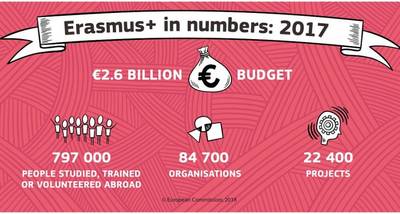Stay in the loop! Subscribe to our mailing list
The latest Erasmus+ statistical report has just been released for 2017 and it demonstrates, once again in the words of Commissioner for Education, Culture, Youth and Sport, Tibor Navracsics, that Erasmus is a true European success story. As Erasmus celebrated 30 years in 2017, the report shows that Erasmus+ is achieving the expected results by supporting 3.7% of young people in the EU in the period 2014-2020 and by encouraging people from disadvantaged backgrounds and smaller organisations to participate.
In particular, 2017 saw the following key achievements among others:

Qualitative information on the Erasmus+ projects can be found on The Erasmus+ Project Results platform. In 30 years, the geographical scope of Erasmus has broadened from 11 to 33 countries, plus several partner countries worldwide. The Commission is now looking at the new 2021-2027 Erasmus programme whose top-priorities are to double the budget to EUR 30 billion, triple the participants to 12 million and improve the level of inclusiveness, accessibility and internationalisation (see ACA Newsletter – Education Europe, May 2018). The upcoming programme will also seek to create a European Education Area by 2025 for ensuring education, learning and training without borders!